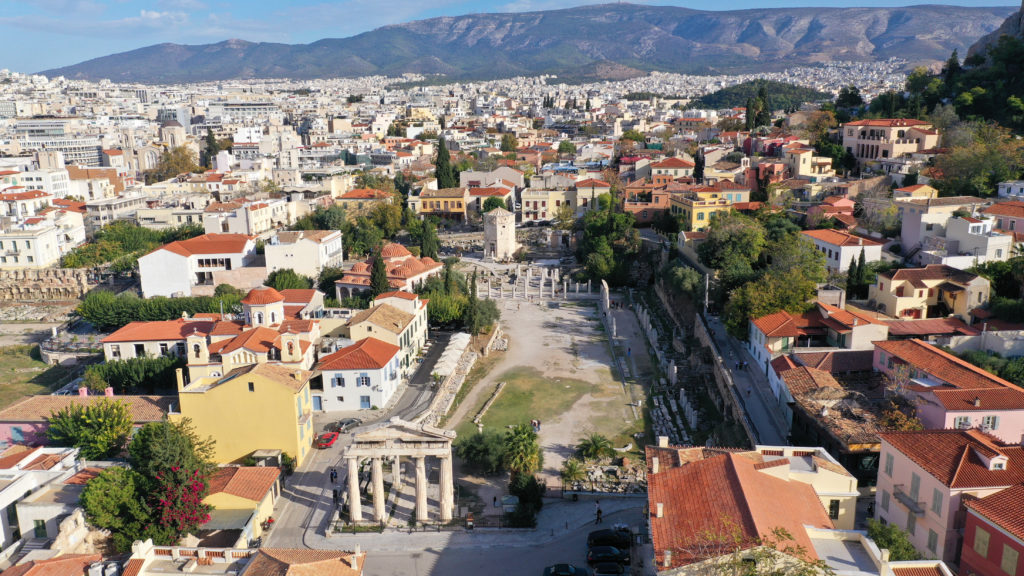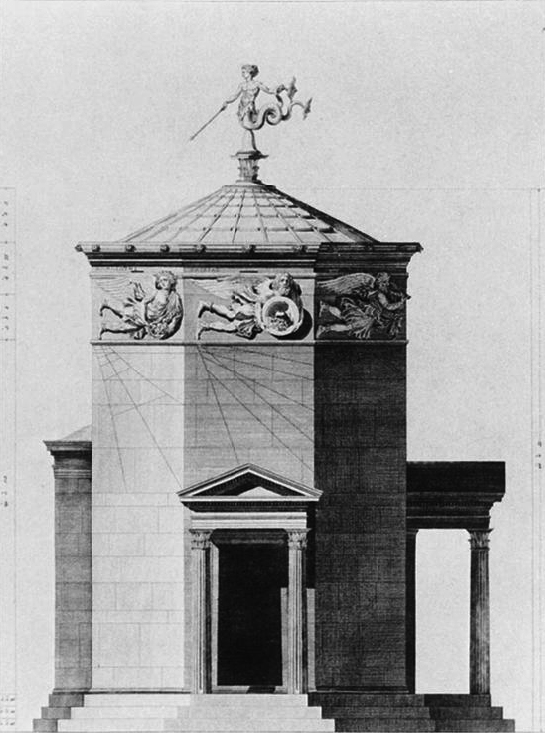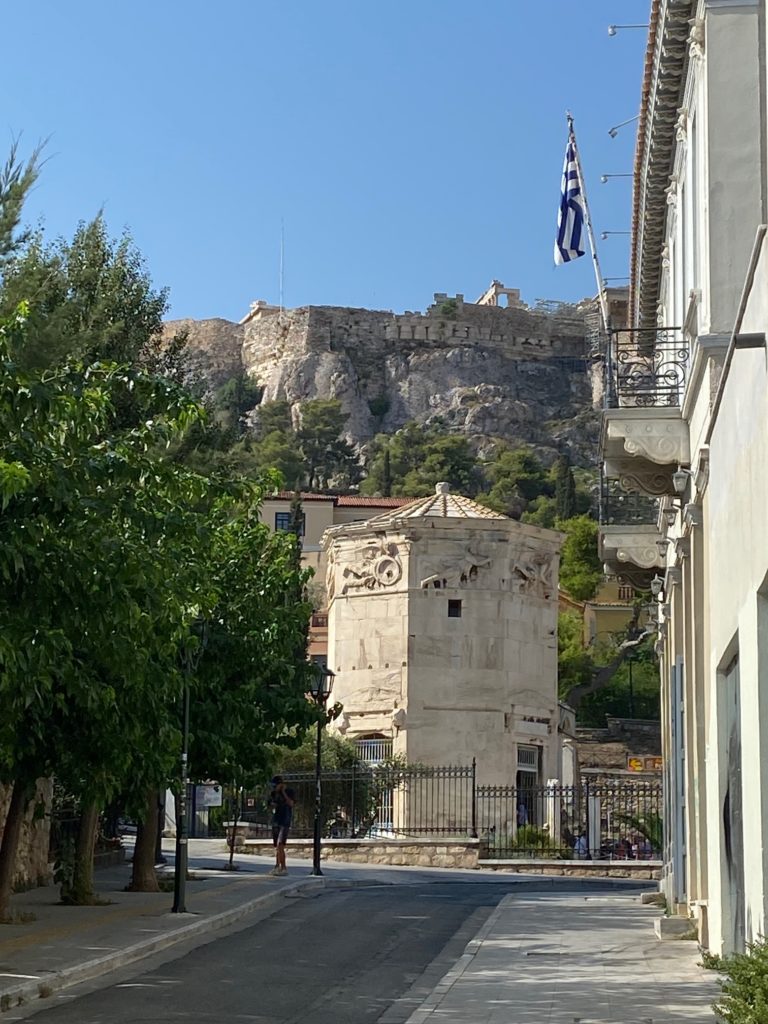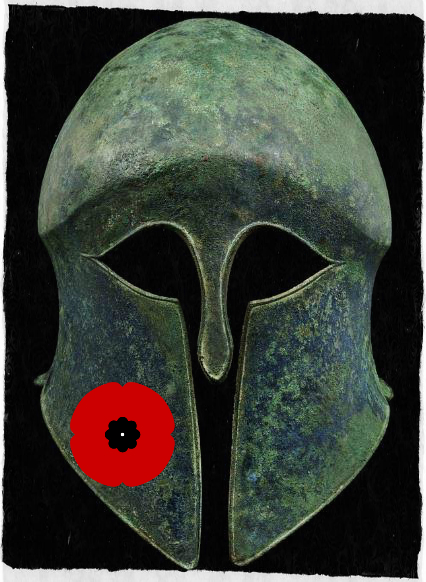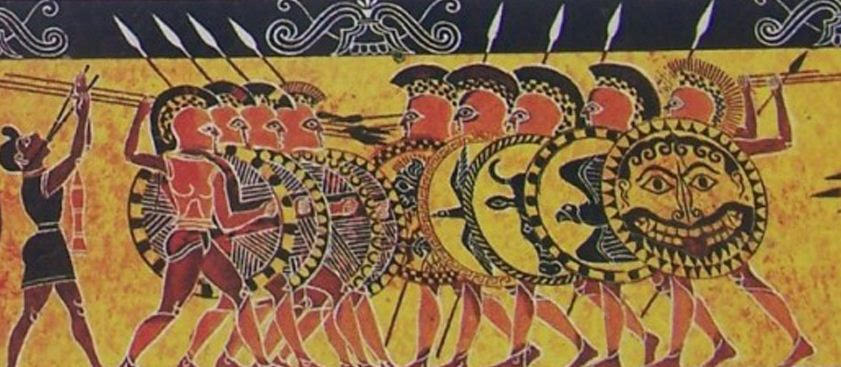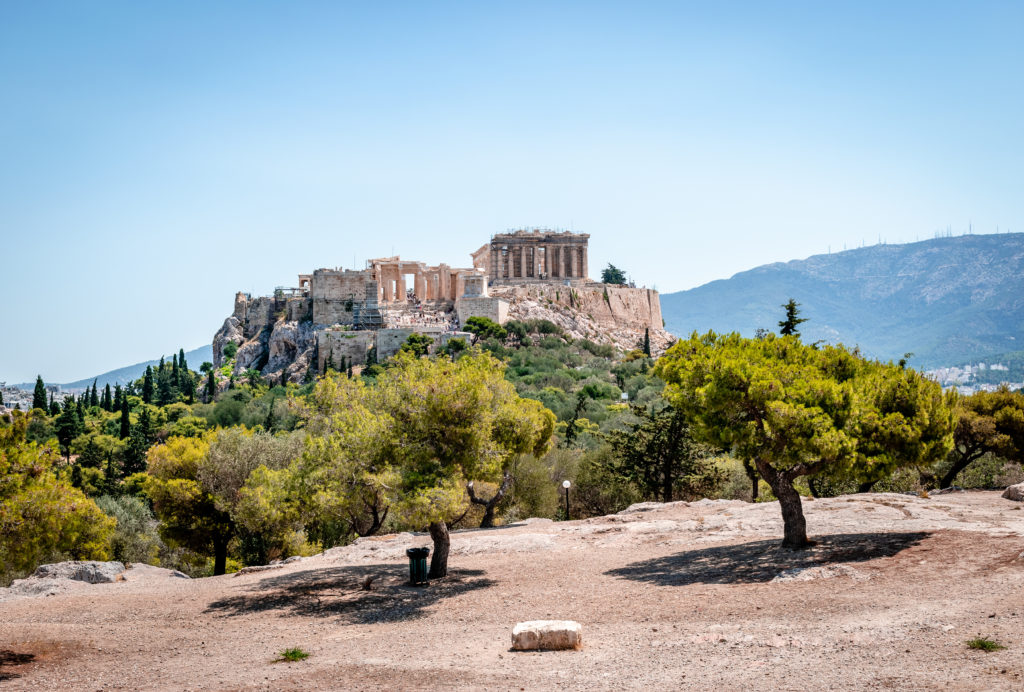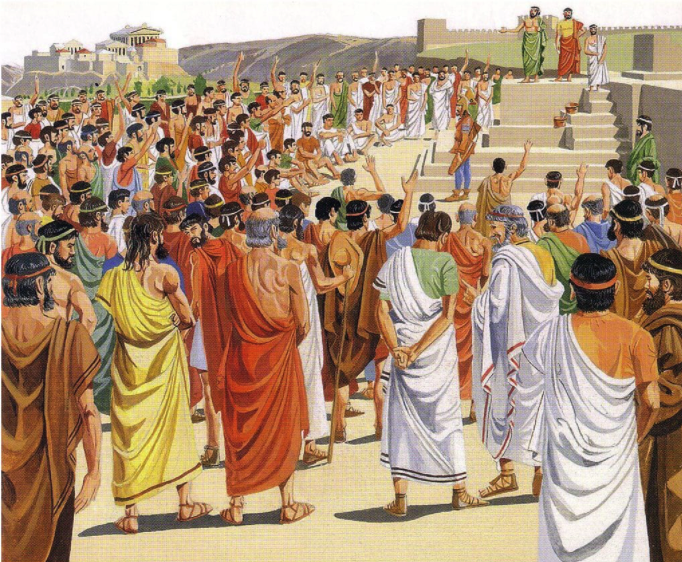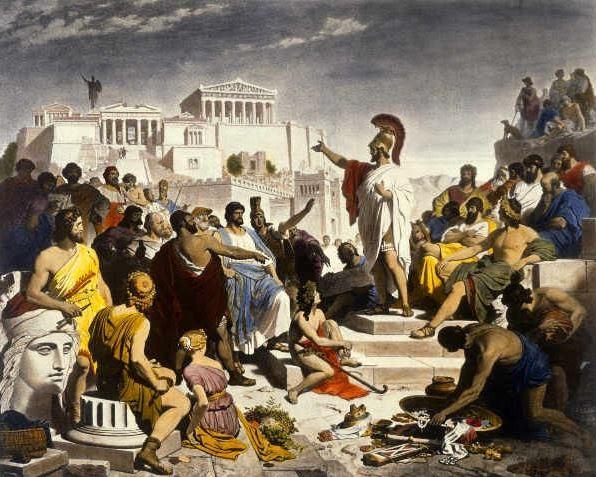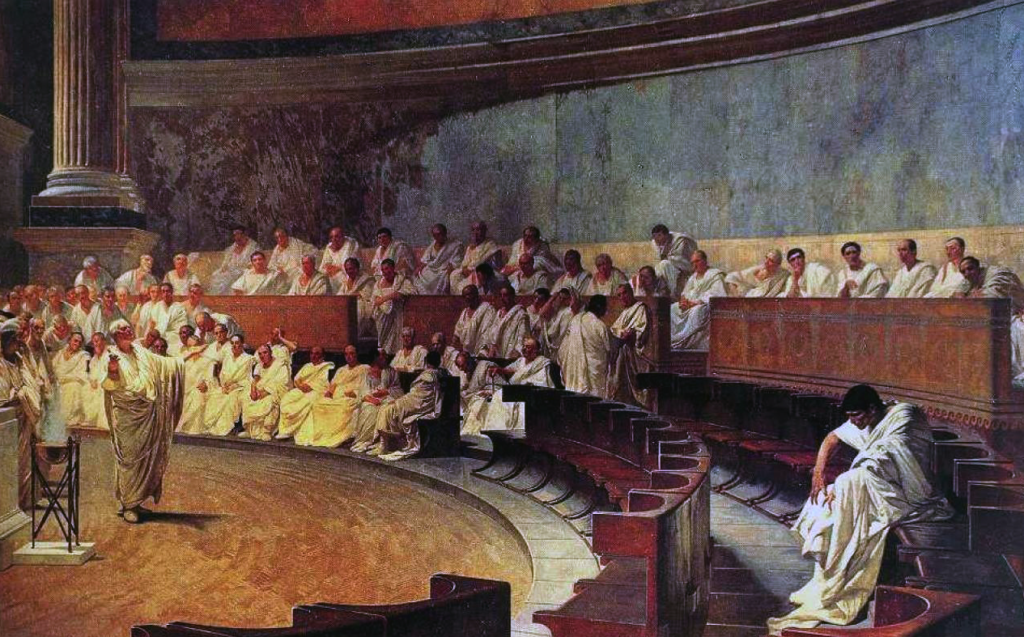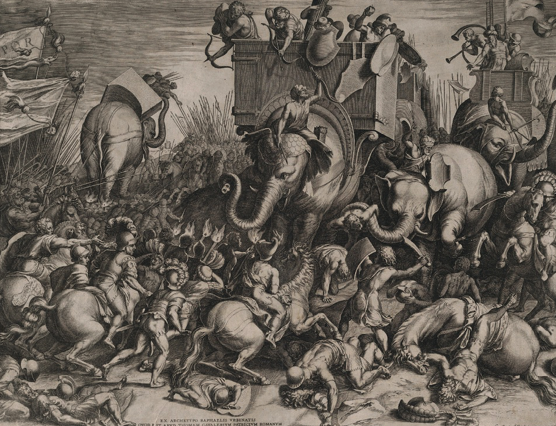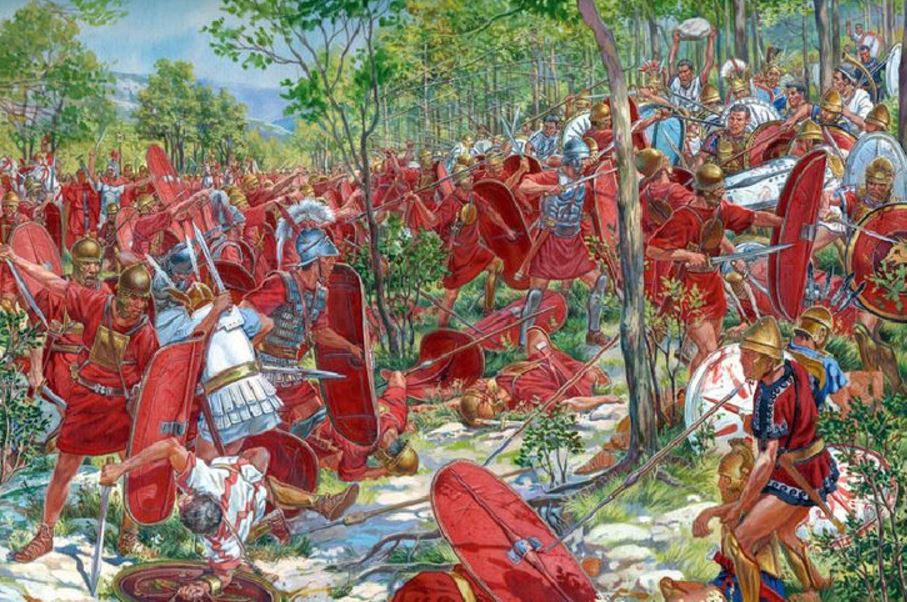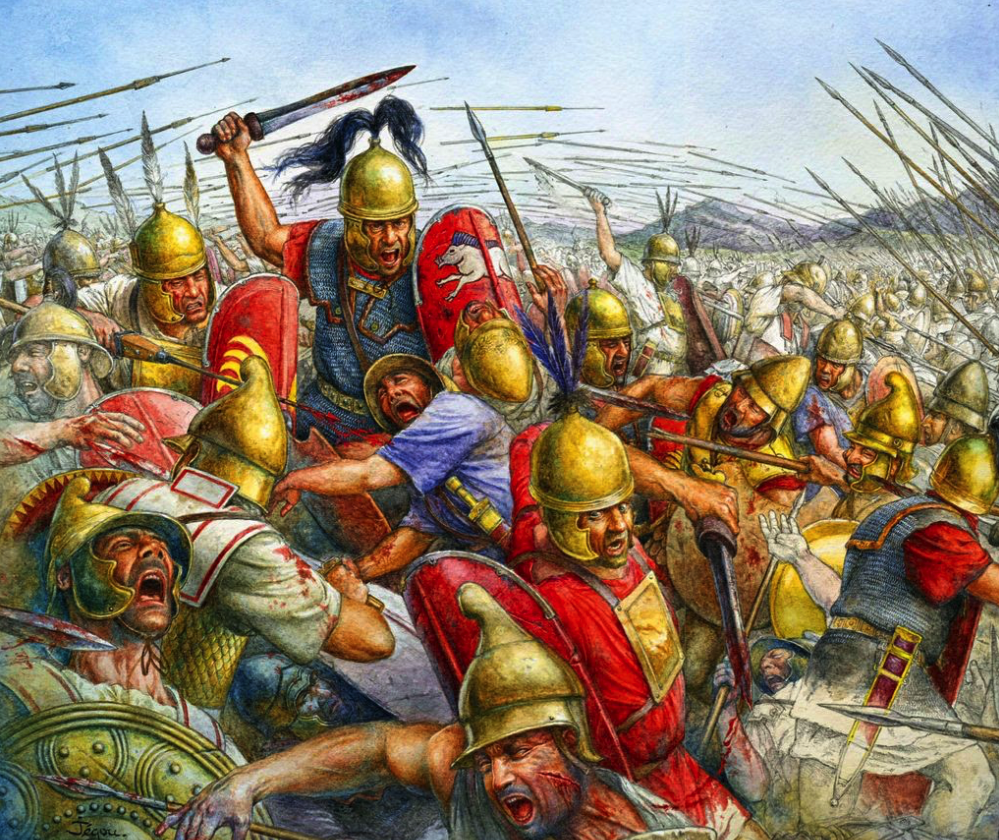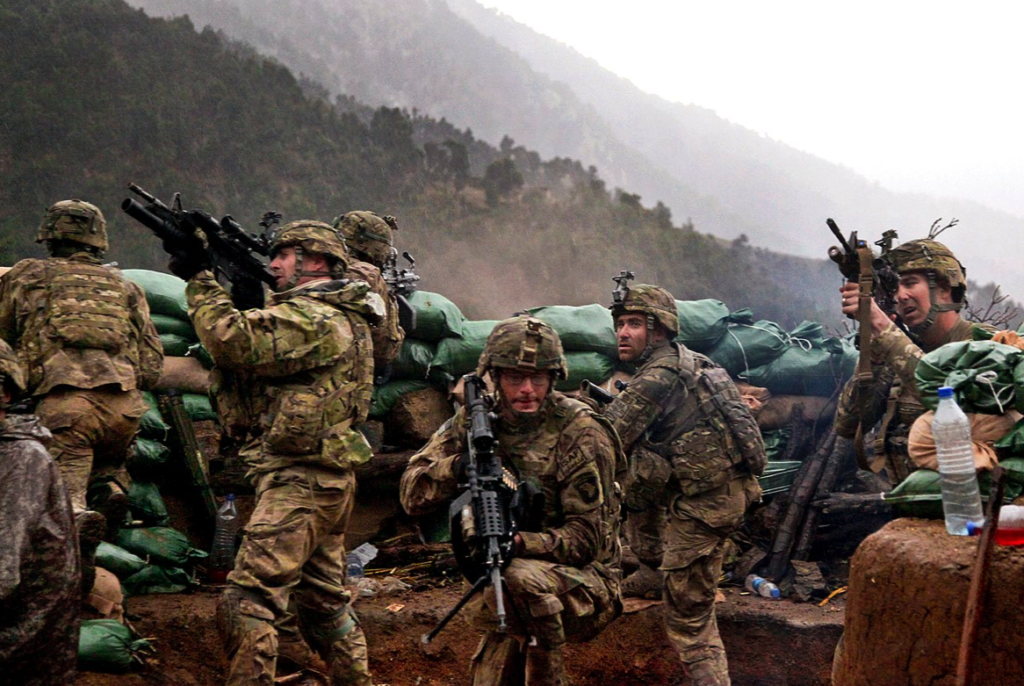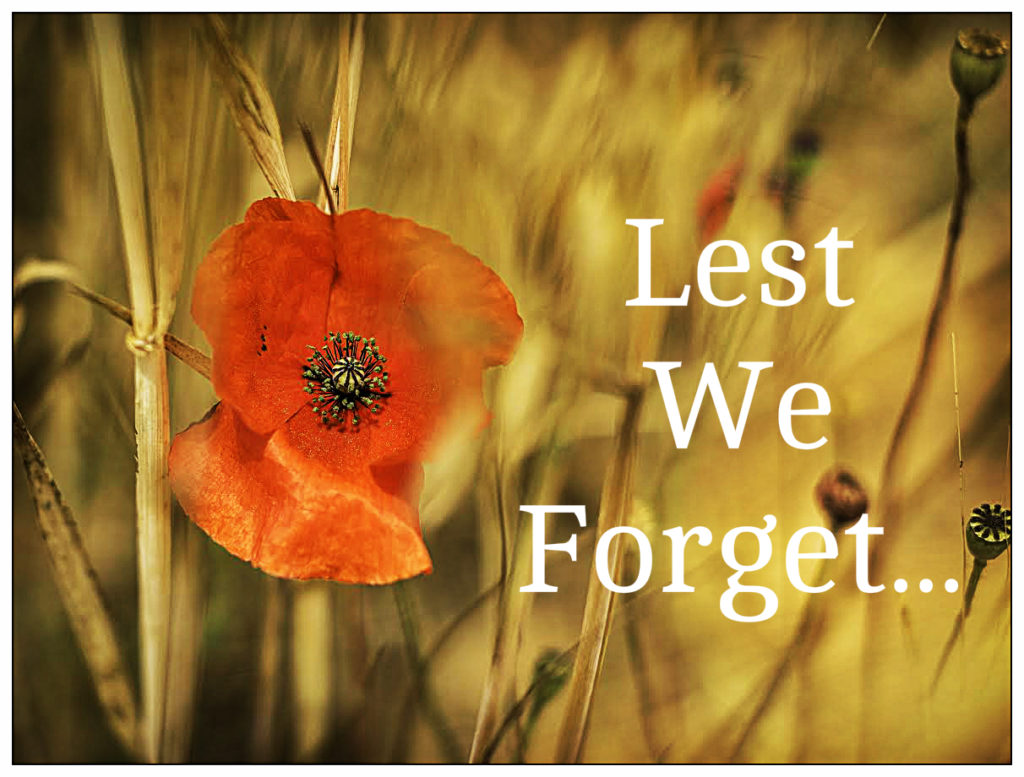When one thinks of the great cities of the ancient world the first that most often comes to mind is Athens. It is a beacon of light, learning, and invention in the far-distant past that continues to inspire and influence us to this day.
It is also my second home, for I have been fortunate enough to return to Athens many times over the years to visit family, and to acquaint myself with the countless historical monuments that still stand, from the Parthenon and Kerameikos, to the often overlooked shrines along the Ilissos River which runs beneath the city.
When I find my way around the city of Athens, I do so by way of its ancient monuments. They have always been my guides, my markers for navigating the warren of streets and alleyways of the city of the Goddess Athena.
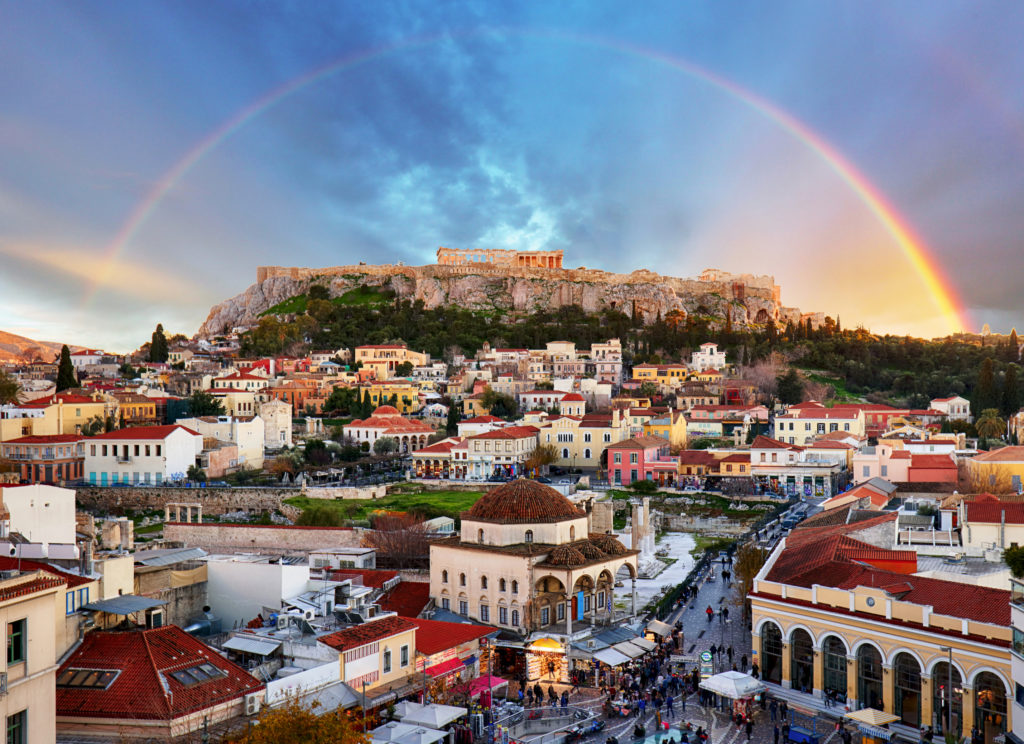
Athens, Greece – Monastiraki Square and ancient Acropolis with rainbow
But Athens is not just a place for those fascinated by mythological and Classical Greece. There is also a great deal for the most ardent of Romanophiles to see, for ancient Athens was loved and admired by a few Roman emperors, foremost among them being Hadrian (A.D. 117-138).
This past summer, while on vacation in Greece, I returned to the historic centre of this ancient city to do some research for the forthcoming second novel in The Etrurian Players series. One of the monuments I was most interested in re-visiting was the Roman Agora of Athens.
Before we get into my visit to the site, we should talk a bit about its history and what there is to see…
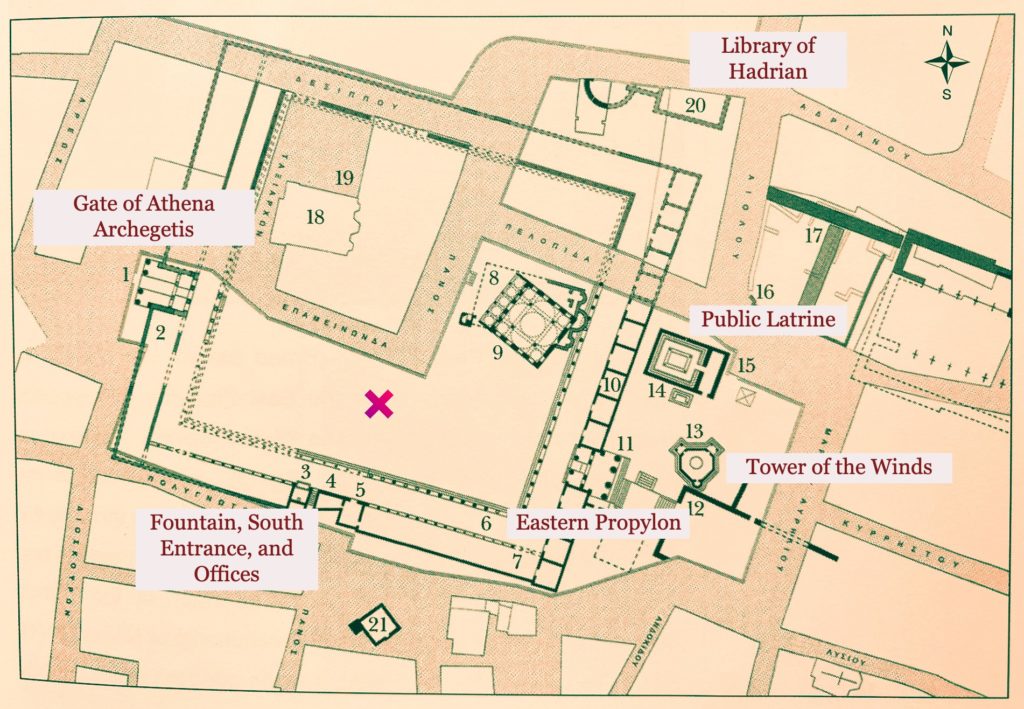
Plan of the Roman Agora
The agora of an ancient Greek city was the central public gathering place. It was the political, social, business, athletic, and religious heart of the city. The agora was where anything of import happened or was decided.
And the city of Athens was fortunate enough to have two of them.
The first agora of Athens was, of course, the ancient one located at the northwest corner of the Acropolis and covering the area between it, the Areopagus, and the massive Dipylon Gate of the city. And the great route of the Panathenaic Way ran through it, all the way to the entrance to the Acropolis.
The ancient agora was filled stoas and temples and monuments to heroes and to the Gods. There were fountains, a library, a mint, offices, altars, sanctuaries and more. And in around 14 B.C., the Roman general, Marcus Vipsanius Agrippa built an odeon in the middle of the ancient agora which had an auditorium for about one thousand spectators.
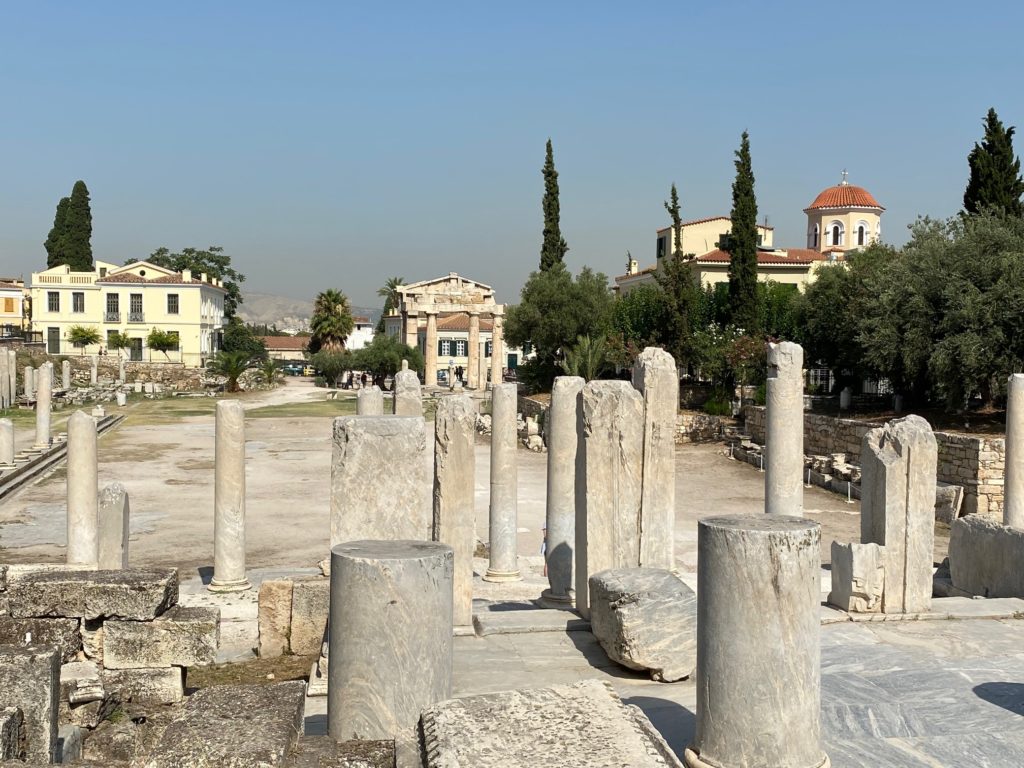
The Roman Agora from the eastern propylon
Just prior to the time that General Agrippa built his odeon, another building project began to take place in the city of Athens, this time sponsored by Emperor Augustus in fulfillment of a promise previously made by Gaius Julius Caesar. This new project was the Roman Agora, also known as the ‘Roman Forum’ of Athens. It was begun in 19 B.C. and finally finished in 11 B.C.
It is said that the reason for this new building project was because the ancient agora had become so full of monuments and buildings that there was no longer a wide open, public gathering place. As we shall see, the new Roman Agora would serve other purposes.
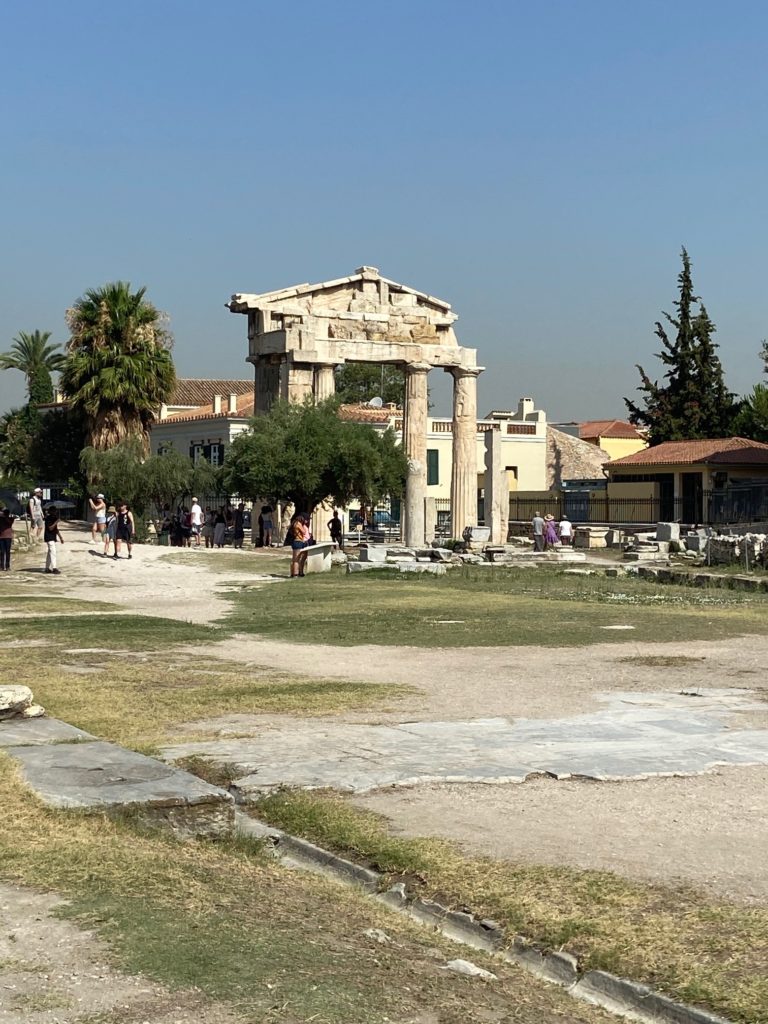
Gate of Athena Archegetis
The new agora, built by Caesar (posthumously) and Augustus, became the commercial centre of Roman Athens and the main oil market of the city. It was the beating heart of Roman Athens.
The monumental western entrance to the agora at the Gate of Athena Archegetis confirms who sponsored the building of the gate and agora with the following inscription:
The People of Athens from the donations offered by Gaius Julius Caesar the God and the Reverend Emperor son of God To Athena Archegetis, on behalf of the soldiers of Eukles from Marathon, who curated it on behalf of his father Herod and who was also an ambassador under the archon Nicias, son of Sarapion, from the demos of Athmonon
Of course, it was dedicated to Athena as the patron goddess of the city, and because it was Athena who had given Athens the olive tree, and hence the all-important olive oil which was sold in the agora.
The importance of the Roman agora as Athens’ main oil market during the Roman period is also reinforced by the inscription bearing Hadrian’s olive oil law on the doorway of the agora which outlined taxes and fines for false declarations of the production, export, or sale of olive oil there.
Atop the Gate of Athena Archegetis was an equestrian statue of Lucius Caesar, the grandson of Emperor Augustus.
The Roman Agora of Athens consisted of a large paved, open-air courtyard that was surrounded by colonnades of white and grey marble from Penteli and Hymettos. The colonnades were covered and had spaces for shops and merchants selling various goods, storerooms, the offices of the market, and a fountain.
There were two propylaea, including the Gate of Athena Archegetis at the west end, and another propylon at the east end. Both entrances aligned with the ancient roads at either side.
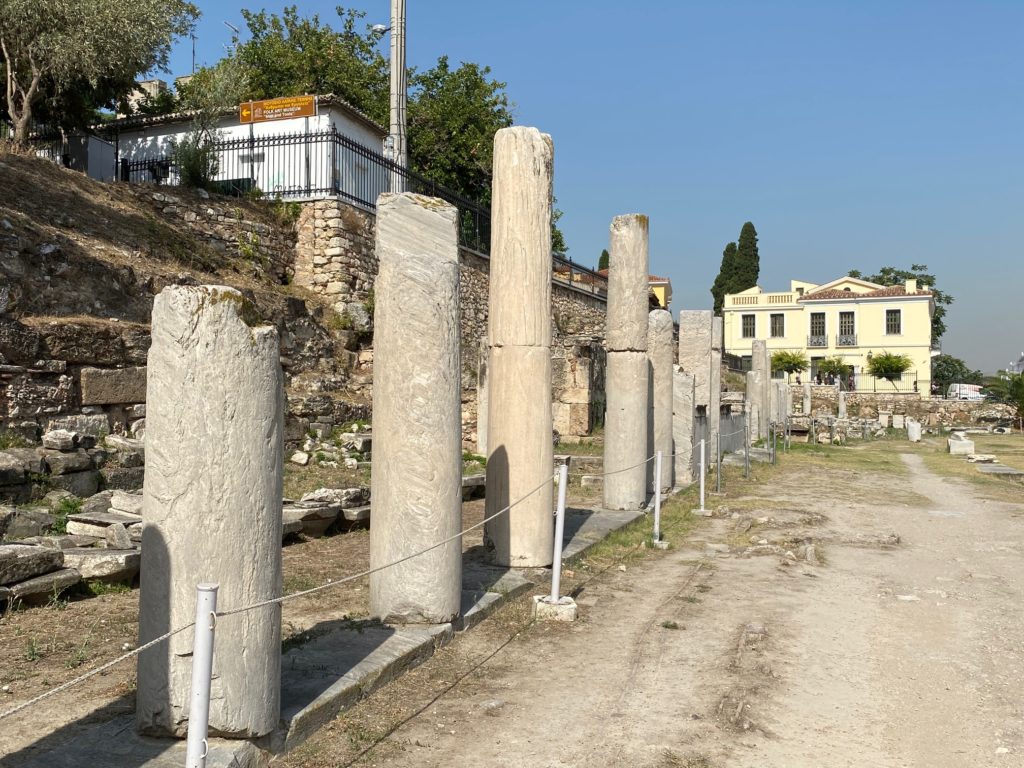
The ‘South Colonnade’ with the remains of the fountains and agora offices on the left
Today, about a third of the north side of the Roman Agora lies beneath the modern streets and buildings, but the south colonnade remains largely intact. Remains, including inscriptions on columns, show that parts of the colonnade were set aside for specific merchants such as oil merchants or butchers. In some of the surviving stylobates, there are also round cavities of varying sizes in the marble that are supposed to have been used to measure out goods.
In the middle of the south colonnade, there was also a fountain with two cisterns at different levels. This was fed from springs on the north slope of the Acropolis just to the south. Also in this location were the market offices where citizens and merchants could pay taxes and take care of other business.
When there was heavy rain, the large court of the agora had an open air drain which allowed for runoff to be carried underground and diverted to the Eridanos River.
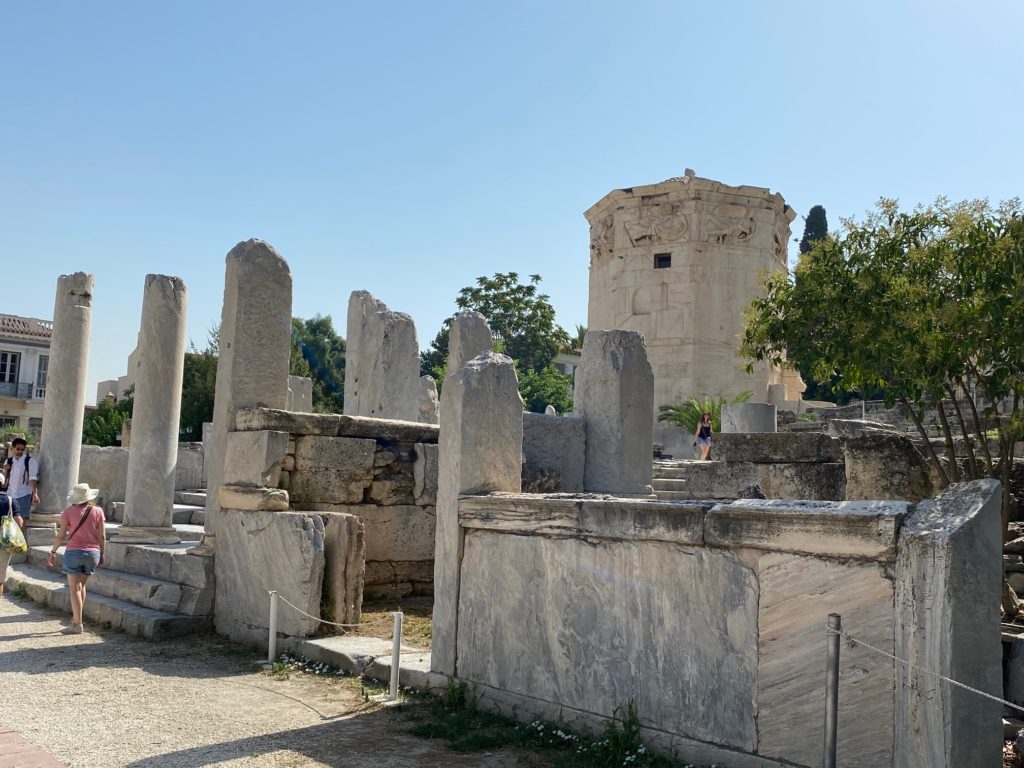
Tower of the Winds behind the eastern propylon of the agora
The Roman Agora today is, perhaps, most famous for what is known as the ‘Tower of the Winds’.
This octagonal structure, located just outside the eastern wall of the Roman Agora, contained the horologion built by the astronomer, Andronikos Kyrestes, in the mid 1st century B.C.
The Roman architect, Vitruvius, wrote about the tower in his work De Architectura…
…those who have inquired more diligently lay down that there are eight (winds): especially indeed Andronikos of Kyrrhos, who also, as an example, built at Athens an octagonal marble tower, and, on the several sides of the octagon, had representations of the winds carved to face their currents. And above that tower he caused to be made a marble upright, and above it he placed a bronze Triton holding a rod in his right hand. He so contrived that it was driven round by the wind, and always faced the current of air, and held the rod as indicator above the representation of the wind blowing.
(Vitruvius, De Architectura, c. 20s B.C.)
The Tower of the Winds is said to be the oldest meteorological station in the world with sundials on the exterior, a hydraulic clock inside, and its bronze weather vane on top indicating the eight winds which is thought to have allowed merchants in the agora to know the winds and estimate the arrival of shipments coming from the port of Piraeus.
Lastly, a few steps from the Tower of the Winds, also just outside the main precinct of the Roman Agora was a large public latrine, or vespasianae, with openings on four sides with a small court for ventilation.
The Roman Agora and the large precinct of the great Library of Hadrian beside it made this area the main administrative centre of the city of Athens, supplanting the classical agora in this role, especially after the Herulian invasion of Athens in A.D. 267.
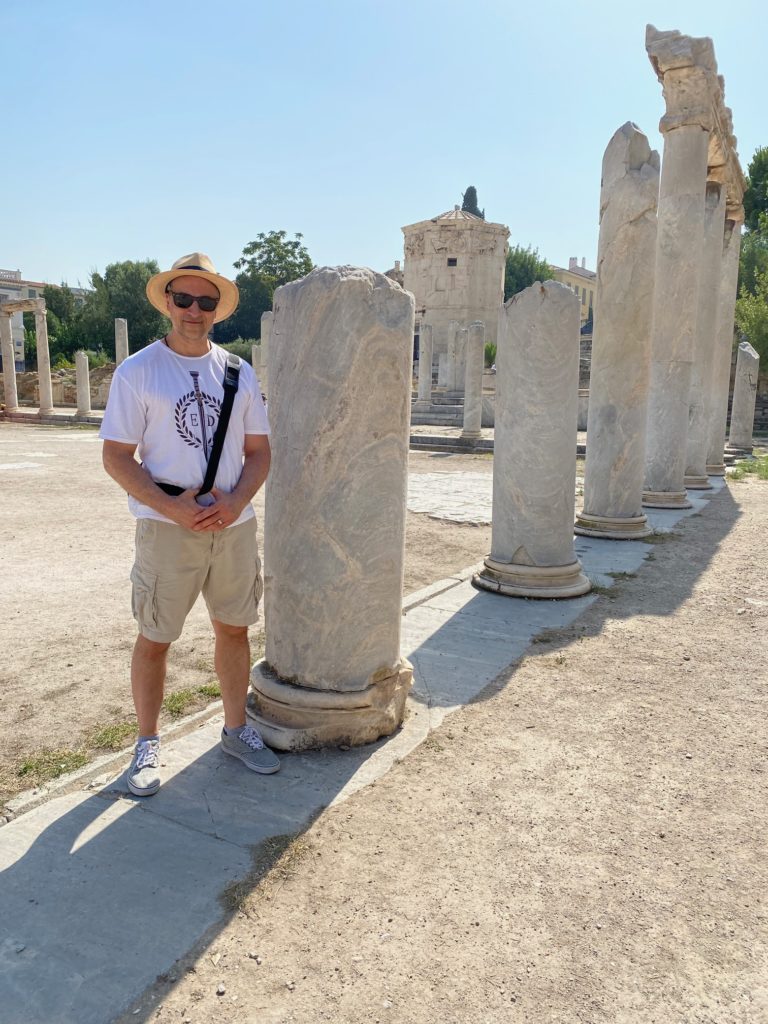
Adam exploring the Roman Agora
As stated, this was not my first time visiting the Roman Agora of Athens. The site has also appeared in the #1 bestselling Eagles and Dragons series prequel novel, A Dragon Among the Eagles. However, each time I go, it is with a different purpose and perspective. This time, it was to research it as a setting in the next Etrurian Players book.
We left our home in Pangrati early so as to try and beat the heat, and because archaeological sites were closing from 11 a.m. – 4 p.m. during the heatwave. Nevertheless, when we arrived it was a scorching 45 degrees Celsius with no intact colonnades to hide beneath as they would have had when the agora was whole.
After making our way through the crammed alleyways of Plaka and Monastiraki, we purchased our tickets at the office across the street and made our way in beside the Gate of Athena Archegetis.
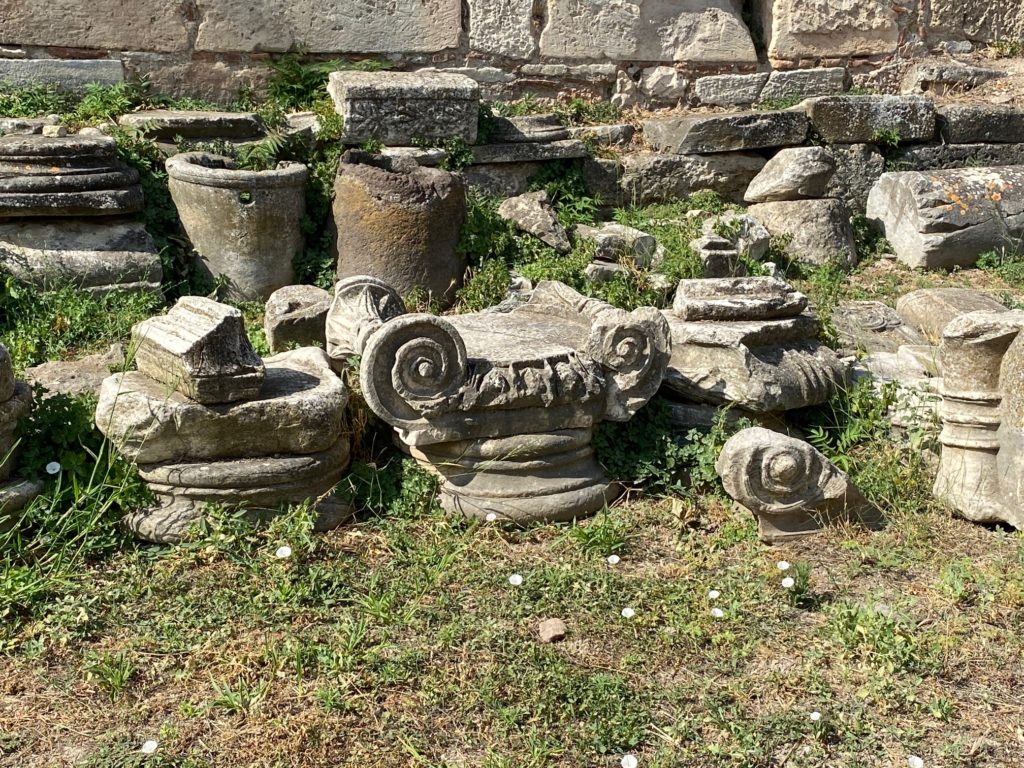
Remains on-site
Once you enter, you are struck by the expanse of the open courtyard of the agora, even though a large portion of it is covered by the streets and buildings to your left. From there, you make your way along the remains of the south colonnade. Here, there are numerous column capitals, a sarcophagus, and other artifacts lying in the parched grass beneath palms where the resident cats and lizards doze and scurry.
As I walked, I could almost hear the crowds of the market around me, the sounds of the merchants selling their wares. I could imagine the tang of the olive oil in my nostrils. The marble courtyard must have been blinding in the midday sun, but one has to imagine that most of the shops would have closed by the sixth hour of daylight for the afternoon rest, as the Greeks and Romans were wont to do.
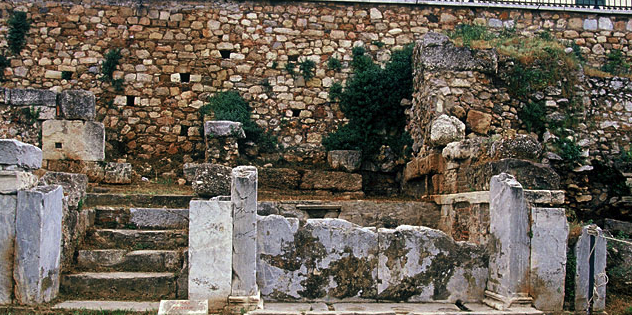
Site of fountain in the Roman Agora
We walked past the fountain and the remains of offices in the middle of the south colonnade and, at the end, found the carved hollows in the stylobate where merchants measured (fairly, one hopes!) out products such as grain or beans.
From there, the small forest of columns and a staircase indicate that you have reached the eastern propylon, the monumental entrance on the other side of the agora. As you walk up the stairs, you are keenly aware of the presence of what is the focal point of the archaeological site: The Tower of the Winds.
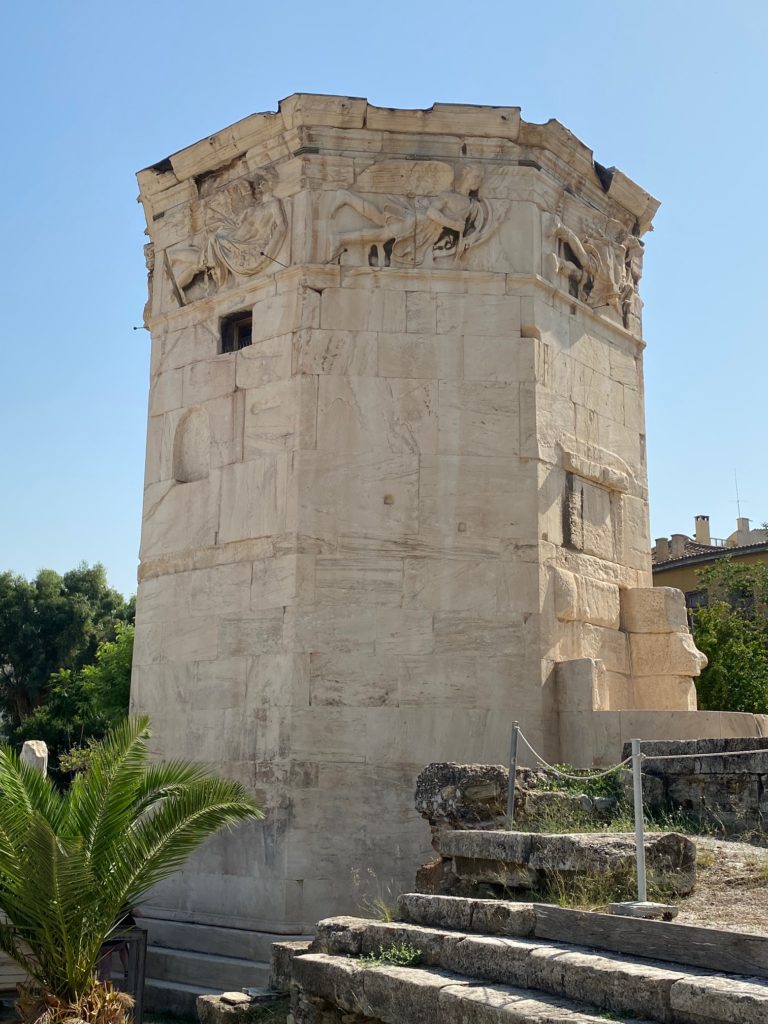
The Tower of the Winds – the oldest meteorological station in the world
The Tower of the Winds is a mesmerizing monument, as simple as it is. But one cannot take one’s eyes off of the images of the winds portrayed about the top. The smooth, white marble surface is beautiful, the lines of the sundials faintly visible.
One can imagine the citizens of ancient Athens walking up to it to check the time, the same as some do today with modern clock towers on some city halls. But this was the heart of Roman Athens, and so this meteorological monument was a fitting addition to this ancient gathering place.
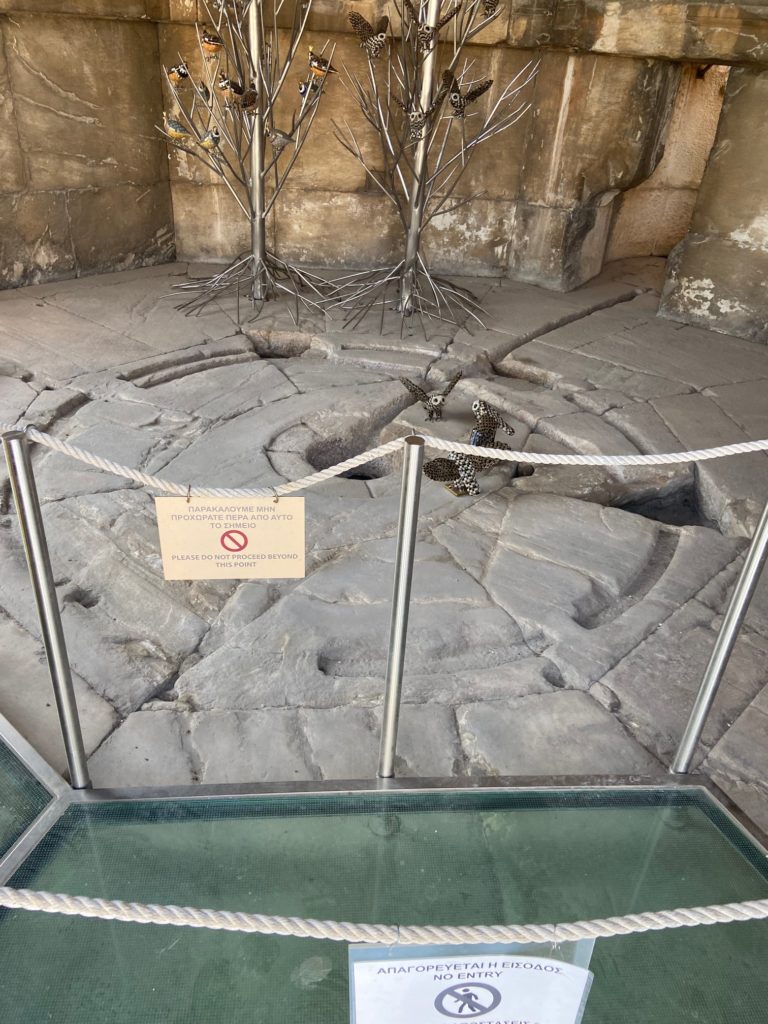
Interior floor of the Tower of the Winds which held the mechanism of the water clock of the horologion
After exploring the area around the Tower of the Winds, including the vespasianae, the public latrine, we walked back across the open space of the great courtyard, taking time to pause.
I imagined this vast, ancient market place bustling with life, filled with people, with myriad things for sale, and the scenes of my novel that I was searching for began to take shape. I could see a beautiful comedic chaos unfolding!
For a writer of historical fiction, the city of Athens is a dream come true, for the bones of the ancient world are still there to see, to feel, and to inspire.
As the heat reached a literal fever pitch, I was finished with my research for the day and sought the nearest taverna for a cold drink in the shade, something which the Greeks and Romans would gladly have done at that time of day.
Thank you for reading.
Be sure to check out the video of our tour of The Roman Agora of Athens in order to experience this site for yourself. You can view it below, or visit the Eagles and Dragons Publishing YouTube channel by CLICKING HERE.
For some excellent digital recreations of the Roman Agora of Athens, check out the very skilled work of the folks at Ancient Athens 3D HERE.

